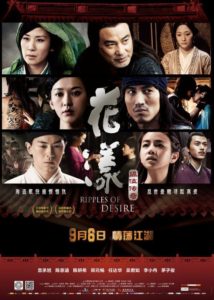Ripples of Desire
花漾
Taiwan/China, 2012, colour, 2.35:1, 122 mins.
Director: Zhou Meiling 周美玲 [Zero Chou].
Rating: 5/10.
Costume yarn set among courtesans and pirates lacks any sense of drama or passion.
Drift Island, somewhere in the South China Sea, Ming dynasty China, mid-July. During the Ghost Festival, a young courtesan, Azalea (Xu Yiqing), tries to escape from the brothel run by Madam Moon (Wu Junru) but drowns in the nearby sea. The small island is a refuge for adventurers and pirates, and is “protected” by the buccaneering Hai Yuan (Ren Dahua), who casually has a Spanish businessman (Boelo Niemeijer) killed by one of his men, Scarface (Yan Chengxu), when the former tries to muscle in on his business. One of Moon’s courtesan-singers, Bai Xiaoshuang (Chen Yihan), dreams of escaping to a new life, maybe with the help of young Scarface. Both she and her elder sister, Bai Xiaoxue (Chen Yanxi), were raised in the brothel after being shipwrecked as  children along with their doctor father (Wu Jiemin), who’d contracted leprosy from one of his patients. The father drowned, and Madam Moon took in the girls. Madam Moon invites a musician, Wen Xiu (Zheng Yuanchang), from the south to voice-coach Bai Xiaoxue; but when she discovers Bai Xiaoxue has the beginnings of leprosy, she replaces her as the brothel’s star attraction with Bai Xiaoshuang. However, Bai Xiaoxue has grown to like Wen Xiu; and meanwhile, Bai Xiaoshuang sets her eyes on new arrival Li (Mao Zijun), a wealthy tea merchant who is unhappily married to Zhen Furong (Li Xiaoran), the true owner of his business.
children along with their doctor father (Wu Jiemin), who’d contracted leprosy from one of his patients. The father drowned, and Madam Moon took in the girls. Madam Moon invites a musician, Wen Xiu (Zheng Yuanchang), from the south to voice-coach Bai Xiaoxue; but when she discovers Bai Xiaoxue has the beginnings of leprosy, she replaces her as the brothel’s star attraction with Bai Xiaoshuang. However, Bai Xiaoxue has grown to like Wen Xiu; and meanwhile, Bai Xiaoshuang sets her eyes on new arrival Li (Mao Zijun), a wealthy tea merchant who is unhappily married to Zhen Furong (Li Xiaoran), the true owner of his business.
REVIEW
What should have been a sensual exploration – set in a lusty pirate’s haven – of how people use and are used by money and their feelings turns out to be anything but in Ripples of Desire 花漾. Hampered by a production-design budget that clearly isn’t up to the job (however much the nimble photography tries to hide the fact), the movie is also constrained by some curious Greater China casting that doesn’t blend easily. Most of all, however, it’s fatally weakened by the inability of writer-director Zhou Meiling 周美玲 [Zero Chou], 43, to construct any convincing drama or evoke any on-screen passion, with the result – spread over an increasingly flaccid two hours – that Ripples hardly disturbs even its own placid emotional surface.
Zhou’s first big-screen feature in almost five years, and funded partly by Mainland money, it could have been a big step up for the Taiwan film-maker, taking her out of the lesbian film-making ghetto through which she made her name at festivals (Spider Lilies 刺青, 2007; Drifting Flowers 漂浪青春, 2008) and into a wider arena – sexually, thematically and geographically. It’s certainly her most accomplished film to date and, at its best, shows Zhou can do more than just cater to a small, card-carrying audience. But after a start that briefly promises something different, Ripples soon shows all her usual weaknesses: poor exposition, arch dialogue, lack of any emotional depth to the characters, and dramatic cliches replacing an original voice.
Set on a small island during the Ming dynasty that’s become a haven for pirates, the story focuses on two orphaned sisters who were raised by a brothel madam when their ship went down. Various characters – a young pirate, a musician and a tea merchant – offer them avenues of escape, but the biggest challenge is the leprosy they both contracted when young. Opening during the mid-July Ghost Festival, the first half-hour is confused in introducing all the protagonists but does at least set up a promising array: the quiet elder sister, the more ambitious younger one, the bottom-line madam, her on-off pirate lover, and the girls’ various amorati. But Zhou’s script can’t construct a convincing drama out of all these ingredients, and the film’s lack of any rhythm – another recurrent fault in her previous movies – makes it a choppy ride.
The actors don’t do much more than clock in and say their lines. As the pirate leader and brothel madam, Hong Kong veterans Ren Dahua 任达华 [Simon Yam] and Wu Junru 吴君如 [Sandra Ng] give the film some solid grounding but Ren lacks any real menace and Wu any real bite. The younger male actors, cast with an eye on the youth market, are colourless: with a headscarf, long wig and facial scar, Taiwan TV actor-singer-model Yan Chengxu 言承旭 looks like a rocker who’s misplaced his guitar; his compatriot, TV actor-model Zheng Yuanchang 郑元畅 is weedy as a “musician from the south”; and Mainland TV’s Mao Zijun 茅子俊 is only fractionally more impassioned as the weak husband of a wealthy tea merchant.
As the latter, China’s Li Xiaoran 李小冉 (The Chinese Botanist’s Daughters Les filles du botaniste, 2006; Driverless 无人驾驶, 2010) is as elegant as usual, and manages to bring some feeling to her role of a cheated wife. But the film largely rests on the shoulders of the two Taiwan actresses playing the sisters – Chen Yanxi 陈妍希 [Michelle Chen] and Chen Yihan 陈意涵, here re-teamed after also playing siblings in the 2009 hit Hear Me 听说. Chen Yanxi, especially hot since You Are the Apple of My Eye 那些年,我们一起追的女孩。 (2011), again shows her limited range with what is largely a puppy-like demureness. Chen Yihan, in a fuller-written role, registers much more strongly as the ambitious one of the two, but doesn’t get much to bounce off from either Yan or Mao. Though both actresses (unrelated in real life) are actually now 30, it doesn’t help that Chen Yanxi consistently looks younger in the role of the elder sister.
When she’s not trying to artfully hide the insufficient budget, Zhou’s regular d.p. Liu Yunhou 刘芸后 (who also doubles as a producer and co-editor) occasionally creates sensual effects via lighting and fabrics, but not in any consistent way. So, too, Taiwan composer Chen Mingzhang 陈明章, who initially uses discreet Chinese instrumentation but later opts for potboiler orchestral music to belatedly try to stir up some drama. A couple of action scenes are staged, shot and cut OK, but don’t seem to have a place in what is basically a straight drama. The films’ Chinese title is simply the name of the brothel, Rippling Flowers.
CREDITS
Presented by Taiwan Culture Ministry (TW), TC-1 Culture Fund (TW), Vision 3 Films (TW), Ko-Hiong-Lang (TW), TIK Films (CN), Beijing Silver Dream Film & Art (CN), Beijing Baishijia Culture Communication (CN). Produced by Vision 3 Films (TW), South Island Film (TW), TC-1 Culture Fund (TW), China Film Co-Production (CN).
Script: Zhou Meiling [Zero Chou]. Photography: Liu Yunhou. Editing: Chen Bowen, Zhou Meiling [Zero Chou], Liu Yunhou. Music: Chen Mingzhang, Li Zheyi. Song music: Chen Mingzhang. Lyrics: Zhou Meiling [Zero Chou]. Production design: Liu Minxiong [Ben Lau]. Art direction: Tang Jiahong, Xu Shanshan. Costume design: Dai Meiling. Sound: Chen Weiliang. Action: Ren Boyan, Lin Wanzhang. Visual effects: Zhang Chengchang (Kent Animation Digital Independent Production). Second camera: Zhuang Ziying.
Cast: Chen Yihan (Bai Xiaoshuang/White Frost), Yan Chengxu (Scarface), Chen Yanxi [Michelle Chen] (Bai Xiaoxue, Bai Xiaoshuang’s elder sister), Zheng Yuanchang (Wen Xiu, music teacher), Li Xiaoran (Zhen Furong/Lotus), Ren Dahua [Simon Yam] (Hai Yuan, pirate leader), Wu Junru [Sandra Ng] (Huayue Niang/Madam Moon), Mao Zijun (Li Ershao, Zhen Furong’s husband), Xu Yiqing (Azalea), Jin Wen (Qin), Tao Chuanzheng (housekeeper), Gao Mengjie (Zhi, boss), Lin Zhiru (lame grandfather), Zhong Yao, Xue Tiying (Ruchun/Spring), Su Xiaoqi (Ruqiu/Autumn), Chen Xiao’en, Huang Peici (Ping, maid), Tang Qinghui (Yun’er, singing courtesan), Guan Qihui (Guihua, singing courtesan), Wu Bilian (senior helper), Gao Tianfa (Weng), Boelo Niemeijer (Boelo, Spanish businessman), Fang Bohua (Boelo’s interpreter), Jiang Zhenglin (Turtle Claws), Zheng Tongcun (Zhao, government official), Liang Jieli (Baozi), Guo Yaoren (Gou/Doggie, pirate), Dong Yanting (Xiaocao/Little Weed, boy), Wu Jiemin (girls’ father), Zheng Yuting (young Bai Xiaoxue), Liao Ziqing (young Bai Xiaoshuang).
Premiere: Gaoxiong Film Festival (Trans-Border Taiwan), 19 Oct 2012.
Release: Taiwan, 28 Dec 2012; China, 6 Sep 2013.
(Review originally published on Film Business Asia, 17 Jul 2013.)
